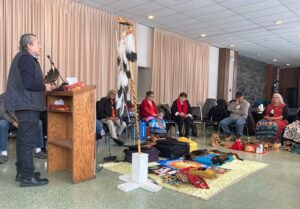Robinson Huron Chiefs gather for emergency meeting

By Catherine Murton Stoehr
SUDBURY— A second emergency meeting of the Robinson Huron Chiefs in as many weeks suggests that perhaps an agreement settling the Robinson Huron Treaty Litigation may be imminent.
The meeting has been called at the midpoint of a two-week mediation period to negotiate an agreement addressing 172 years of provincial and federal governments’ failure to uphold Treaty commitments economically through underpayments, and diplomatically, through refusal to meet regularly.
The complexity of the case required extensive pre-trial conferences to corral all of the legal questions into manageable groupings. Court hearings for the resulting three-trial format commenced in 2017 and stopped abruptly on Jan. 16, when Ontario agreed to a two-week mediation process and broke the logjam. Canada had already indicated a willingness to negotiate.
Some things are known about a possible agreement. It would be between the 23 First Nations within the Robinson Huron and the governments of Ontario and Canada. While the Robinson Superior Treaty is identical to the Robinson Huron Treaty, it is a separate agreement and those communities can go through a process to negotiate their claims. Should the current mediation lead to an agreement, it would create a precedent for the Robinson Superior communities.
That said, Ogimaa Scott McLeod of Nipissing First Nation affirmed the closeness between the Robinson Huron and Superior communities saying they were “open to communications with Robinson Superior communities, not to discuss specifics, but about working together. We’re all on the same team.”
Unlike some agreements where Canadian and provincial governments have leveraged payments to undermine Indigenous jurisdiction or weaken inherent rights, it is unlikely that this agreement will not include restrictions limiting what the communities can do with their share of the money. Almost certainly though, a considerable sum will be necessary to cover the costs of the litigation and other legal commitments.
In similar cases, communities have decided for themselves how to disperse their own moneys. In the recent Williams Treaties First Nations Settlement Agreement, almost all communities kept a percentage of the funds for large-scale projects that would benefit generations to come, releasing the rest in evenly divided individual payments. Only Curve Lake First Nation where Chief and Council faced intense community pressure, released 100 per cent of the funds to individuals.
Ogimaa McLeod shared a conversation he had had with other members of the group about histories he has heard from historians Alan Corbiere (M’Chigeeng First Nation), Heidi Bohaker, and James Morrison over the course of this long journey. Those historians shared that on their arrival in this territory, the British offered the Anishinabek a relationship guided by the legal principle of the Covenant Chain. A set of protocols perfected over centuries to safeguard relations between various First Nations and European visitors, the Covenant Chain is said to be made of silver, impervious to rust but in need of regular polishing. Ogimaa McLeod said that the Covenant Chain between the Robinson Huron communities and the Crown has not been polished since 1850, and as a result, grievances went unaddressed. This process, called treaty renewal by some, may well polish the chain for the first time in 172 years.
Asked if he is comfortable with the provincial and federal courts adjudicating any future conflicts between the parties, Ogimaa McLeod said he hopes that part of a potential agreement will be laying out a process for decision-making going forward. Laughing he added, “the last thing we all want is to be back here again in 100 years!”


